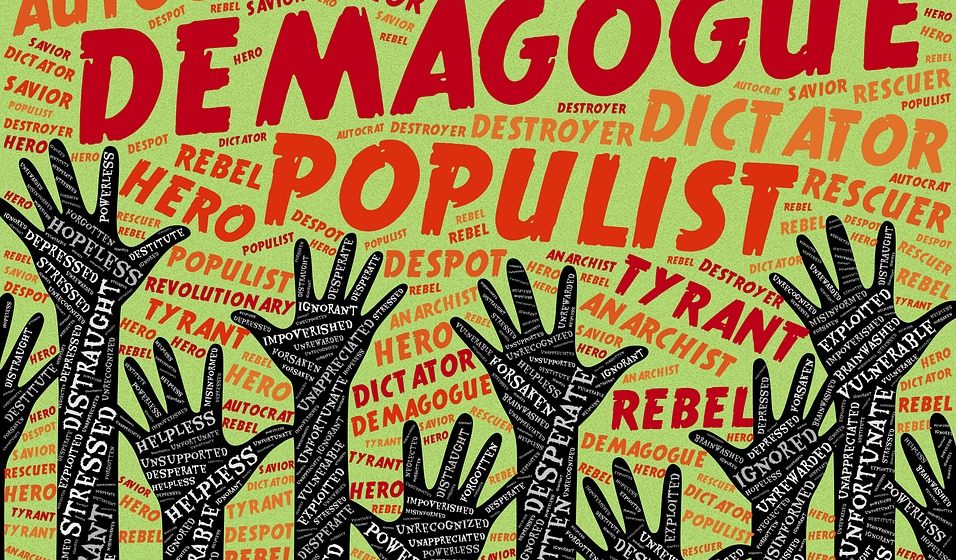Since the fall of the Berlin Wall, liberal ideals have defined Europe’s political order. Parties that questioned free trade and democratic checks-and-balances could hardly gain many votes. Cultural tolerance and religious neutrality was the norm. The EU was seen not only as an engine of wealth, but also as an ethical power spreading liberal norms throughout the world. This era is now approaching its end. Liberal ideals are under fire from Helsinki to Athens.
There are many local variations of the anti-liberal surge, but let us not delude ourselves: populism is not just confined to Hungary, Greece and Poland. Nigel Farage and his populist party UKIP have triumphed in the Brexit referendum. The Freedom Party of Austria, which came to “fame” under its late leader, Jörg Haider, has just entered the coalition government after very successful elections. The Five Star Movement led by a comedian, Beppe Grillo, is set to win the forthcoming Italian elections. Populist parties prop-up governments in Denmark and Finland. Even in prosperous and stable Germany, the right-wing nationalist Alternative for Germany (AfD) entered the Bundestag with nearly a hundred seats. Let us also keep in mind that much of the inspiration for this anti-liberal surge comes from the United States of America and its president Donald Trump.
The Liberal Project’s Failures
Populists are gaining votes not because they have charismatic leaders and attractive programs. They are in vogue because liberals have utterly discredited their noble project. To use the well-known metaphor, they made a fish soup out of the beautiful liberal aquarium. This can hardly be reversed.
The list of liberal faults since 1989 is long and worrying. Inequalities increased dramatically under the liberal reign, tax dodging became widespread, and cuts to social spending notorious. This was the case even for Europe’s economic tigers. Poland’s GDP grew over 20 per cent in the last decade, yet Poland is also a champion in precariat, i.e. zero hours contracts that give employees little or no job security and social benefits. Poland is also a champion in earnings disparities: the 10 per cent best-paid employees earn at least twice as much as the 10 per cent lowest-paid in Sweden, and nearly five times as much in Poland. In the debt ridden countries of Southern Europe unemployment and poverty have rocketed over recent years, making a mockery of the liberal ideal of economic freedom.
Democracy has also been weakened if not perverted over past years. Its pillars – parliaments, parties and the media – have experienced damaging scandals across the continent and lost the trust of ordinary people. Unelected bodies such as central banks, constitutional courts, and the European Commission have progressively been authorised to make key decisions. Elections were organised, but they failed to generate genuine policy changes: power alternated between the same parties with similar programs and led by the same cast of politicians. No wonder demonstrations of angry young people across Europe were full of banners suggesting that “vote” does not amount to “voice” in liberal democracies.
Liberals have not performed much better in international politics. Countries have been invaded with no UN mandate and then left to rot in the hands of local warlords. Prisoners have been tortured. Espionage of digital communications have become the norm. Whistle-blowers uncovering all these inconvenient truths have been persecuted. Autocrats in neighbouring countries have repeatedly been bribed to maintained “stability” and to keep migrants at bay, while democracy and human rights campaigners have progressively been abandoned. Think about the liberal response to the Arab Spring.
European integration used to be the flagship of the liberal project generating prosperity and cooperation. Yet in recent years, it has become a symbol of austerity, stagnation and conflict. The Euro was meant to help integrate Europe, but it achieved the opposite: it exacerbated the gaps and disputes between the surplus and deficit countries, the importers and exporters, and the North and South. The Schengen system was meant to offer an effective and ethical system of handling migration, but it achieved the reverse (unless anyone believes that the EU deal with President Erdogan is ethical and durable). The European Neighbourhood policy was meant to create a “zone of prosperity” and a “ring of friends,” but it is hard to find any prosperous friends across the EU’s borders at present.
None of this is fake news. These are widely known facts pointing to the liberal record in office across Europe. Populists may well utilise these facts for their own partisan aims, they may demonise some aspects of the liberal legacy, and they may lack credible alternatives to the liberal project. That said, one should not be surprised that voters have begun to desert liberals and search for alternatives, however untested and controversial.
What is to be done?
I am a lifelong liberal and I am profoundly disappointed by the current predicament. Populist insurgents will not just stop at correcting liberals’ mistakes: they will go further by destroying many institutions without which democracy cannot function and capitalism becomes predatory. Yet liberals cannot talk about the populist threat without acknowledging their own mistakes. Liberals should start looking in the mirror and stop finger pointing. Liberty is not going to prevail in an atmosphere of hate and vengeance directed against political opponents. Liberals should try to regain voters’ trust rather than accusing voters of getting mad and being misled. Democracy is not safe when we question the wisdom of electoral choices.
I obviously do not propose storming the modern equivalents of the Winter Palace, be it Canary Wharf in London or La défense in Paris. However, I want to urge liberals to stop, if not reverse, the neo-liberal policies of deregulation and privatization. Those with money (often virtual money) should not feel free to abuse workers, damage the environment, and appropriate common cultural heritage. They should be adequately taxed and made accountable for breaking laws and regulations. Companies should be asked to have representatives of workers and consumers on their boards. The universal minimum wage should be tried less timidly and various forms of the sharing economy ought to be promoted. The Tobin tax of financial transactions should also be tried together with various forms of parallel currencies and ‘timebanks’. Some of these experiments may fail, but it is better to experiment than to allow the economic injustices to persist.
Experiments should also be embraced in the field of democracy. We should have a closer look at local initiatives such as the Barcelona-style municipalismo and at different forms of e-democracy. The Internet transformed a range of social relationships, but liberals are still fond of centralized institutionalism when it comes to democratic governance. In fact, the anti-liberal insurgents are already utilizing the Internet for permanent consultations between their leaders and supporters. This explains, in part, why young people are engaging with these movements and not with elitist and old-fashioned liberals.
The new version of an open society should take into account the plurality, heterogeneity, and hybridity of a Europe shaped by globalization. International economic transactions, communication flows, and migratory movements demand strong transnational public authorities. The increasingly dysfunctional EU is not up to the challenge. Liberals need to offer a bold plan for reinventing European integration. This plan should envisage integration along functional rather than territorial lines. It should also embrace pluralism and flexibility. Different policy fields require different types of membership, different modes of engagement, and different mixtures of incentives and sanctions. The new vision of integration should emphasize problem-solving capacities and this requires flexible and diversified rules that are able to cope with a complex and ever-changing environment.
Liberalism will only bounce back if it appeals to young people, which means that the new vision of the open society ought to look forward rather than back. Liberalism should be the force for social progress and technological innovation. It cannot be a device for maintaining the status-quo and preserving the interests of those in power. When I was young, liberalism had a powerful sex appeal, but I sense that today my sons are no longer seduced by it in the same way as I was three or four decades earlier.
This post draws on Jan Zielonka’s recently published book Counter-revolution. Liberal Europe in Retreat, Oxford University Press 2018. A version of this blog post appeared first in Dutch on February, 3rd in the NRC Handelsblad.







